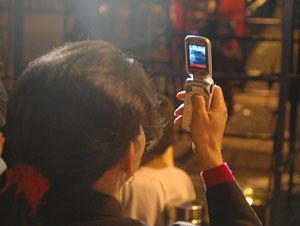Environmental sensors in mobile phones
CC: Flickmor / Flickr
The following is not a full transcript; for full story, listen to audio.
According to the Pew Research Center, more than three-quarters of Americans own mobile phones. Imagine if more than connecting with familiy and friends and snapping pictures, mobile phones could also collect information like pollution or pollen levels.
Eric Paulos, assistant professor at Carnegie Mellon University’s Human-Computer Interaction Institute in Pittsburgh, wants to put tiny environmental sensors he hopes to implant in mobile phones soon. He wants people to become "citizen scientists," measuring things around them.
"We are looking at specifically things like carbon monoxide, sulfer dioxide, nitrogen dioxide, ozone, and particulate matter. Particulate matter is particles in the air. We are also looking for indicators for people that have respiratory problems like asthma. Often times these are ways for them to judge what parts of a city or town or community or state are easy for them to access, health-wise."
While these sensors are not yet in mobile phones, they have been deployed in a number of other places to gather data. They have been attached to street sweepers in San Francisco, to taxi cabs and to student backpacks in a city in Ghana. When people started to read these sensors, their behaviors did change. They talked about it more with familiy members, they changed their travel routes, and changed departure times. The taxi cab participants in the Ghana study brought in their taxis for inspection, as they felt that they might be part of the problem.
"People started to be more informed, and act in a pro-active manner," says Paulos.
"Here and Now" is an essential midday news magazine for those who want the latest news and expanded conversation on today’s hot-button topics: public affairs, foreign policy, science and technology, the arts and more.
PRI’s coverage of social entrepreneurship is supported by the Skoll Foundation.
